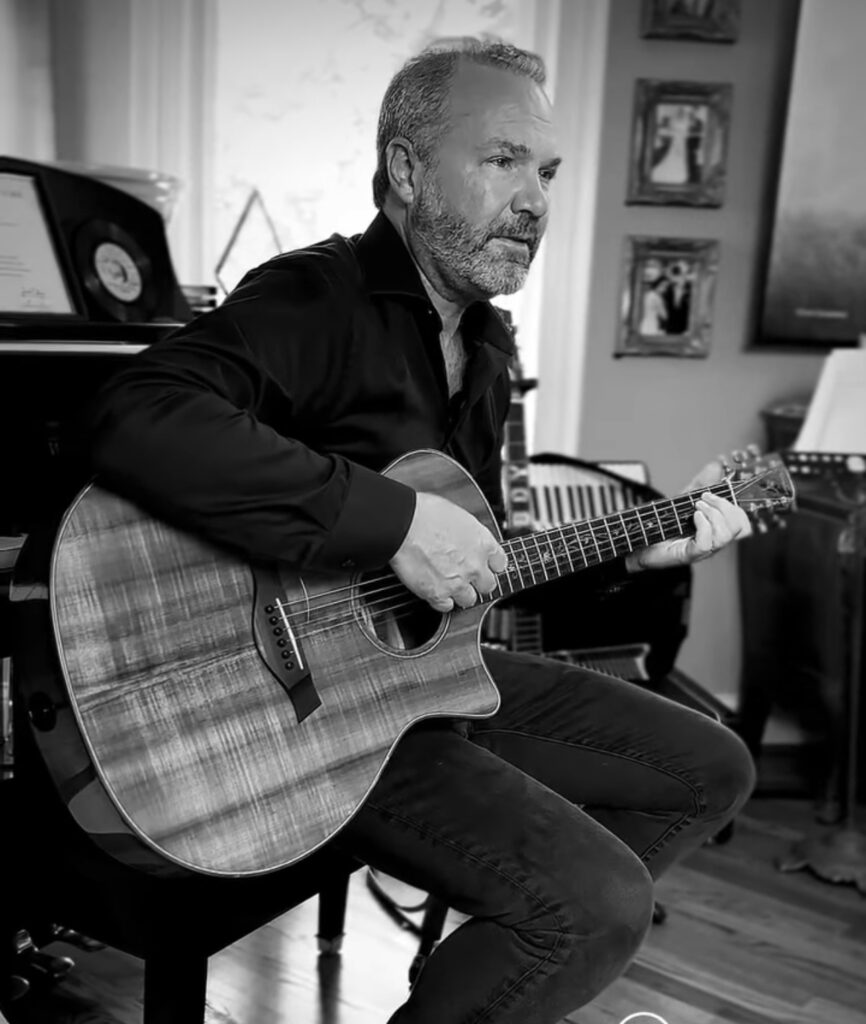
by Katie Klemmensen | Listen Now Podcast
Omaha, NEB.- Grammy-nominated singer-songwriter John Ondrasik – best known by his stage name Five for Fighting – is set to bring an intimate string quartet performance to Omaha’s Admiral theater on Saturday, April 26. The Los Angeles native, famous for early-2000s hits like “Superman (It’s Not Easy)” and “100 Years,” will be joined on stage by a four-piece ensemble of top-notch musicians: Katie Kresek and Melissa Tong on violin, Chris Cardona on viola, and Peter Sachon on cello. Kresek is a Tony Award-winning concertmaster (co-orchestrator of Moulin Rouge! The Musical), Tong toured with pop star Post Malone, and both Cardona and Sachon have extensive Broadway credentials.

Fans can expect a unique twist on Five for Fighting’s catalogue in this seated show (doors open at 7 p.m., show at 8 p.m.; tickets $45–$65. The string quartet format allows Ondrasik to revisit familiar songs with lush arrangements and share the stories behind them in a storytellers-style setting. “It allows me to pull some different songs out of my catalog; the strings add a different dynamic to the popular songs. It keeps everything fresh,” Ondrasik said of performing with the quartet on tour. The evening will also feature opening act Lace & Lee, a folk-rock duo comprised of Caroline Lace and Olivia Lee. Known for their ethereal vocal harmonies and ’60s/’70s-inspired storytelling. Lace & Lee toured with Five for Fighting last year and have become, as Ondrasik puts it, “my favorite new duo.”
This Omaha date is part of a spring series of string quartet shows Ondrasik is kicking off in the Midwest. The singer says the format creates an intimate, family-friendly atmosphere – one that even honors those who serve. “I’m excited to debut new songs, recent arrangements, stories and surprises while sharing the stage with our opener, the fantastic Lace & Lee,” Ondrasik said. “As always, this will be a family show that recognizes our troops and first responders. I can’t wait to roll across America with these world-class musicians who have become my second family.”
Songs of Conscience: Music as Social Advocacy
Beyond his chart-topping ballads, Ondrasik has in recent years used his music as a vehicle for social commentary on real-world events. In September 2021, he released the song “Blood on My Hands,” a passionate response to the chaotic U.S. withdrawal from Afghanistan. The track, which Ondrasik describes as a protest song taking a moral (not political) stance on the issue, sparked widespread discussion – even facing brief censorship when its graphic music video was removed (and later reinstated) on YouTube. A few months later, as war erupted in Eastern Europe, Ondrasik wrote “Can One Man Save the World?” in tribute to Ukrainian president Volodymyr Zelenskyy and the resilience of the Ukrainian people. In July 2022, he traveled to Kyiv to perform the song live with a Ukrainian orchestra amid the ruins of the Antonov Airport, in front of the famed “Mriya” cargo plane destroyed early in the conflict.

“To witness the fortitude of the Ukrainian people, against the backdrop of Putin’s atrocities, was infuriating, inspiring, and every emotion you can imagine,” Ondrasik once said of that profound experience.
Most recently, Ondrasik turned his attention to another global crisis with the single “OK”, released in January 2024. He wrote “OK” (with the refrain “We are not OK”) after the October 7 Hamas attacks in Israel, aiming to call out rising antisemitism and what he saw as moral equivocation in their aftermath.
“After the horrifying Hamas atrocities, I was disgusted with the moral relativism and clear antisemitism being displayed around the world in so many of our institutions,” he told The Times of Israel, emphasizing that the song “is a moral message, not a political one.” Ondrasik’s willingness to tackle such controversial topics through songwriting sets him apart in today’s music landscape. It’s a role he embraces wholeheartedly. “At this point in my career, I find energy and purpose in using my platform as a songwriter to shine the light on causes important to me,” Ondrasik said. “Be it Afghanistan, Ukraine, or here at home, we all have our role to play in answering the question, ‘What kind of world do you want?’
Ondrasik’s activism isn’t limited to writing songs; he has also rolled up his sleeves to support causes he believes in. He has performed for U.S. troops overseas on USO tours and organized charity compilations for military families. His new web docu-series “Meet the Heroes” highlights stories of Americans involved in the Afghanistan evacuation efforts, a project he launched after “Blood on My Hands” opened doors to further advocacy. Whether through music or multimedia, Ondrasik is leveraging his voice to spotlight those he calls “true heroes” – and challenging others to pay attention.
Let Music Fill My World: Championing Music Education
Another cause close to Ondrasik’s heart is music education. In fact, he has put his name and energy behind a nationwide initiative to bring music programs back to schools. Ondrasik is a co-founder of Let Music Fill My World, a privately funded non-profit on a mission to ensure every child in America has access to music education. In partnership with the Tullman Family Office, the organization launched the Music Matters Challenge, a contest aimed at spotlighting the transformative power of school music programs. Now in its second year, the 2025 Challenge invites students and individuals across the country to share how music has impacted them – through personal stories and creative performances – for a chance to win grants and prizes that ultimately fund music teachers in under-resourced schools.
Ondrasik’s eyes light up when discussing this project. Last year, as part of Let Music Fill My World’s work on Chicago’s West Side, he co-wrote an original song titled “Let Music Fill My World” with students from Farragut Career Academy, helping them craft lyrics, record the song, and even film a music video. The initiative didn’t stop at a song – it funded a full-time music teacher’s salary at that high school for three years, proving the tangible impact such a program can have. This year’s Music Matters Challenge builds on that success.
For Ondrasik, who often speaks about how “music truly matters” in people’s lives, supporting the next generation of musicians and music lovers is a natural extension of his advocacy. He noted that in an era when arts funding is too often on the chopping block, initiatives like this are vital to “turn up the volume” on the importance of music education. And he is not alone in this mission – he’s helped unite a coalition of music and education nonprofits to collectively push for. Omaha concertgoers might even hear a mention of the Music Matters Challenge during the show, as Ondrasik continues to rally support. “Music is a universal language that connects, heals and inspires,” he said, “and I want to do my part to make sure that opportunity is there for every kid.”
Navigating a Changing Music Industry
With over two decades in the business, Ondrasik has witnessed firsthand the seismic shifts in the music industry – from the tail end of the CD era to the rise of streaming and social media. “I caught the last wave when ‘Superman’ was a hit,” he explained, reflecting on how much the landscape has changed since his 2001 breakthrough. “2001 was the year record companies sold the most records, and then with streaming, everything collapsed. Tour support went away, then budgets went away. The whole landscape changed pretty quickly.”
The silver lining, Ondrasik says, is the new technology that has lowered the barriers for emerging artists. “The beauty of the world today is that you don’t need to spend $200,000 to make a record. You can make a great-sounding record on your laptop, and with social media, you don’t need a record company to be heard,” he said, noting how in many ways the playing field has been leveled for DIY musicians. On the flip side, the ease of releasing music means the market is more crowded than ever. Success in this digital age requires not just talent, but tenacity. “It is as much about building your platform as it is about writing the songs,” Ondrasik said of coaching young artists on coming up today.
Ondrasik said he has also found ways to adapt by diversifying his creative outlets. Over the years, his songwriting has extended beyond his own albums into film, television and commercials. Five for Fighting songs have been featured in more than 350 on-screen projects – from the Oscar-winning film The Blind Side to TV dramas like Hawaii Five-O, The Sopranos and Code Black. “When I write a song, I never know where it might end up,” he said. “Seeing a song like ‘100 Years’ or ‘Chances’ used in a movie or show that moves people – it’s incredibly gratifying because it gives the song a life of its own.” Ondrasik has contributed music to soundtracks and even penned special material for television (Hawaii Five-0 once featured an exclusive Five for Fighting song in a milestone episode). While the industry’s delivery mechanisms have evolved, Ondrasik’s core approach remains old-school: focus on writing authentic songs. “Trends come and go, but a great song is timeless,” he said. “That’s one thing that hasn’t changed.”
From Math to Music: Staying Grounded
It might surprise fans to learn that the man behind soulful hits like “100 Years” and “The Riddle” is also a bona fide math whiz. Ondrasik holds a degree in applied science and mathematics from UCLA, an academic backup plan he pursued even as he was honing his craft as a young musician. “Math was the plan B to get a real job when the music thing imploded,” Ondrasik said with a laugh. In fact, practicality runs in the family. When he’s not on stage, John Ondrasik also helps run his family’s business – a Los Angeles-based company called Precision Wire Products that was founded by his grandfather in the 1940s. The company manufactures wire goods (Ondrasik likes to say it “makes the best shopping cart in the worldand he has managed the business alongside his father throughout his music career.
Working at Precision Wire is more than just a day job for Ondrasik; it’s a link to his heritage and another source of pride. “We have a family business as wire artisans that was founded by my grandfather 78 years ago,” he noted. “I’ve been working a lot with that. My son works here. Balancing these two worlds, the creative realm of music and the practical demands of running a business, might seem daunting, but Ondrasik believes each informs the other. The discipline and work ethic required in the office have helped keep him grounded amid the whims of show business. And his success in music has, in turn, allowed him to give back to his community (and employees) in meaningful ways. In presentations and keynote speeches, Ondrasik often references how he merges creativity and business acumen, crediting his dual identity as songwriter and entrepreneur to being the son of an astrophysicist father and a piano-teacher mother. “I come from a family of scientists and musicians, so I suppose it was inevitable I’d do both,” he joked.
That strong foundation might explain Ondrasik’s longevity in an industry known for one-hit wonders. He’s quick to point out that having interests outside of music – whether it’s family, business or philanthropy – has kept him inspired without burning out. “It gives me perspective. At the end of the day, I can walk out of a meeting about steel wire designs and go write a song to clear my head, or vice versa,” he said. Five for Fighting may be his stage moniker (appropriately, a hockey term for a five-minute penalty), but offstage Ondrasik comes across less like a rock star and more like a down-to-earth family man who just happens to have a platinum record or two on the wall.
Advice for Young Artists: Perseverance and Passion
Before wrapping up our conversation, I asked Ondrasik what advice he would give to the many college-aged musicians tuning into MavRadio or dreaming of their own big break. His answer: focus on the craft and put in the work. “You need to write a lot of songs,” he said plainly. “I wrote a couple thousand songs before anybody heard one. You need to imitate and learn your craft. You also have to record your songs and listen back to them… With the technology today, you don’t have to be in a fancy studio to do it.”
The most important step, Ondrasik insists, is to get on stage whenever possible. “The third [priority], which is always the hardest to do, is to perform live,” he continued. “Performing live tells you what you have. When you write a song, your parents and friends might like it, but you never really know until you get out there in front of an audience. Live performance is the best teacher you will ever have.”
Ondrasik speaks from experience – his own road to success was a marathon, not a sprint. He spent the 1990s playing coffeehouses and mailing out demo tapes, faced rejection from numerous record labels, and didn’t score a major hit until his mid-30s. That hit, of course, was “Superman,” which became an anthem after 9/11 and launched Five for Fighting into stardom. Even then, Ondrasik had to keep proving himself, album after album. It’s a journey that taught him the value of resilience. “To have a career in music has a little to do with talent, and a lot to do with relationships and a work ethic,” he noted, emphasizing that networking and persistence are key over the long haul. Building genuine relationships in the industry – with fellow artists, mentors, fans and behind-the-scenes champions – can often open doors that pure talent alone cannot. And a strong work ethic will carry an artist through the inevitable ups and downs. “Give yourself a Plan B,” Ondrasik advised young creatives.
Finally, Ondrasik reminds young artists (and perhaps all of us) why we chase creativity in the first place. Despite all his success, he still sees himself as a fan who feels lucky to “be living the dream” writing and performing music for a living. That enduring joy is something he hopes to share with the Omaha audience. As he takes The Admiral’s stage on April 26, John Ondrasik will not only bring a repertoire of beloved songs and new material, but also hard-earned wisdom, heartfelt advocacy, and the message that music matters – perhaps now more than ever. College radio listeners and local music fans can look forward to an evening of stories and songs that inspire, provoke thought, and remind us why we’re “100 Years” young at heart when the right melody plays.
Five for Fighting with String Quartet, featuring John Ondrasik and special guests Lace & Lee, will perform at The Admiral (2234 S. 13th St., Omaha) on April 26 at 8 p.m. (doors at 7 p.m.). Tickets are available via admiralomaha.com. The Music Matters Challenge is open through May 30, 2025; details at LetMusicFillMyWorld.org.






